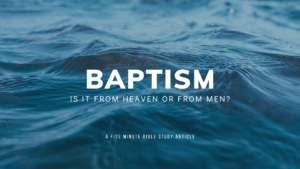If you like plot twists and things that aren’t what they appear at first sight, you will like this little read. Over the years of Bible study, I am periodically reminded that God has a sense of humor. Specifically, God has a knack for irony.
Irony
a state of affairs or an event that seems deliberately contrary to what one expects and is often amusing as a result.
— Oxford Dictionary
Irony surfaces in scripture perhaps more than the average reader realizes. Through irony, God reminds us of the spiritual realities that are shielded by the hum-drum of 8 to 5 timecards. Perhaps we lose sight of the fact that God is in control at all times, because we are having a terrible week, month, or year. Perhaps we underestimate the maliciousness of Satan when we see temptation for nothing more than an innocent trifle. Irony helps bring these realities into focus. It pauses the reader in his tracks and makes him think twice.
Consider a few instances of irony found in familiar Bible stories. Here are a few that came to my mind after just a few moments of reflection.
• Joseph’s brothers sell him to slave traders and tell Jacob he died. Years later, the same brothers come to Joseph to buy grain from him so they won’t die.
• The wicked Haman builds a gallows and noose to execute Mordecai, but Haman ends up being the one executed on his own rope.
• David tells Nathan that a man who would steal a poor man’s only sheep deserves to die. In so doing, he indicts himself for having stolen a poor man’s only wife (2 Sam. 12:5-6).
• Caiaphas, the high priest of Israel, accuses Jesus of blasphemy. But in reality, Caiaphas was the one guilty of blasphemy. And while Jesus was being accused of blaspheming God in the heavens, Caiaphas was blaspheming God in the flesh to His very face (Matt. 26:65-66).
We could add to this list at length, but instead I have chosen seven passages of scripture where God teaches rich truths using irony.
1. Jesus saved others, be He could not save Himself.
Matthew 27:41-42, “Likewise the chief priests also, mocking with the scribes and elders, said, ‘He saved others; Himself He cannot save. If He is the King of Israel, let Him now come down from the cross, and we will believe Him.'”
If Jesus was going to accomplish the work His Father had given Him to do, He could not come off the cross. It’s true, Jesus couldn’t save Himself, but it had nothing to do with Him being weak in power and ability. No, Jesus couldn’t come off the cross, because the mockers were the ones unable to save THEMselves.
2. The Man mocked and worshiped as a king actually is the King.
Matthew 27:27-29, “Then the soldiers of the governor took Jesus into the Praetorium and gathered the whole garrison around Him. And they stripped Him and put a scarlet robe on Him. When they had twisted a crown of thorns, they put it on His head, and a reed in His right hand. And they bowed the knee before Him and mocked Him, saying, ‘Hail, King of the Jews!'”
These soldiers had no idea that their kneeling and bowing to Jesus was actually the most appropriate thing they could have done given the reality of Jesus’ personhood. And one day, these very soldiers, along with trillions more who have mocked Christ, will bow and worship the King of kings and Lord of lords.
3. The rich are poor and the poor are rich.
Revelation 3:17-18, “Because you say, ‘I am rich, have become wealthy, and have need of nothing’—and do not know that you are wretched, miserable, poor, blind, and naked—I counsel you to buy from Me gold refined in the fire, that you may be rich; and white garments, that you may be clothed, that the shame of your nakedness may not be revealed; and anoint your eyes with eye salve, that you may see.”
This is a funny saying. Jesus first tells these physically rich church members at Laodicea that they are piddly poor, and then He compels these peasants to “buy” spiritual gold from Him. A beggar buying gold, that’s ironic. And so we see past the bling and cravings of earth happy people for what they really are. We learn that the truly rich have a savings account in heaven.
4. You have to mourn to experience real joy.
Psalm 126:5-6, “Those who sow in tears shall reap in joy. He who continually goes forth weeping, bearing seed for sowing, shall doubtless come again with rejoicing, bringing his sheaves with him.”
Matthew 5:4, “Blessed are those who mourn, for they shall be comforted.”
The irony of every Christian’s funeral is that it is pure joy and pure sadness at the same time. In the first century times, the day a Jew became a Christian might very well be pure joy and simultaneously pure sadness; because, while they became members of the family of God, they were being cut off from their Jewish family on earth. Death, excommunications for the sake of Christ, and other earth side bipolar events make sense of the Holy Spirit’s advice to consider sufferings as pure joy (James 1:2).
5. The church grows the most when it is suppressed.
Acts 5:40, “And they agreed with him, and when they (Jewish leaders) had called for the apostles and beaten them, they commanded that they (Peter and John) should not speak in the name of Jesus, and let them go.
Here we see the harsh reality of the early church- beatings and oppression. When Satan can’t finesse God’s people to the pits of hell by trifle temptations, he goes for the throat. And why not? Oppression should do the trick, right? But what do we read next in the Acts story?
Acts 6:7, “Then the word of God spread, and the number of the disciples multiplied greatly in Jerusalem, and a great many of the priests were obedient to the faith.”
The irony of the gospel is that, many times throughout scripture and history, the more the church is oppressed, the more it is refined and the more it grows. Fire can melt or it can cleanse. As Paul said to Timothy, “I suffer trouble as an evildoer, even to the point of chains; but the word of God is not chained,” (2 Timothy 2:9).
6. People that finish first will get a last place ribbon.
Matthew 20:16 (The Parable of Workers in the Vineyard), “So the last will be first, and the first last. For many are called, but few chosen.”
Remember this when you try to achieve success by sidestepping ethics. Remember this when you are jealous of the arrogant fool who got promoted instead of you. Remember this, most importantly, when the denominations are feeding sinners with burgers, rock concerts, felt needs conferences, etc. It may be tempting to switch your kale, broccoli, and truth salad for that, but first place in attendance doesn’t necessarily translate to first place ribbons. Success doesn’t pay earth side.
7. To live you must die & to save your life you must lose it.
2 Timothy 2:11
This is a faithful saying: for if we died with Him, we shall also live with Him.
Luke 9:24
24 For whoever desires to save his life will lose it, but whoever loses his life for My sake will save it.
This message is not very different from the last one. If Jesus’ and Paul’s ironic message could be summed up in one word, it would be this: compromise. Don’t compromise, because life is not what it appears at first sight.




Comments
As I was researching the word irony and its place in Scripture for an article I am writing this article came up. What a blessing!! The Scripture references were just what I was looking for and the article itself was a great read. There is actually one sentence from your article I would like to quote you and your article in my article; it is the last sentence: “Don’t compromise, because life is not what it appears at first site.” It fits well with the theme of the article which is in part a take on the Wizzard of Oz, regarding the curtain. If you rather I didn’t that’s ok too.
Also, I love the idea of the Five Minute Bible Study. So often I don’t have a lot of time for in-depth study but want to take a few a break and read different Christian articles.
Author
I’m so glad you found the article to be helpful! Yes, you are more than welcome to quote the article. There are several Five Minute Bible Series on the website that are several lesson series, around five minutes each lesson.